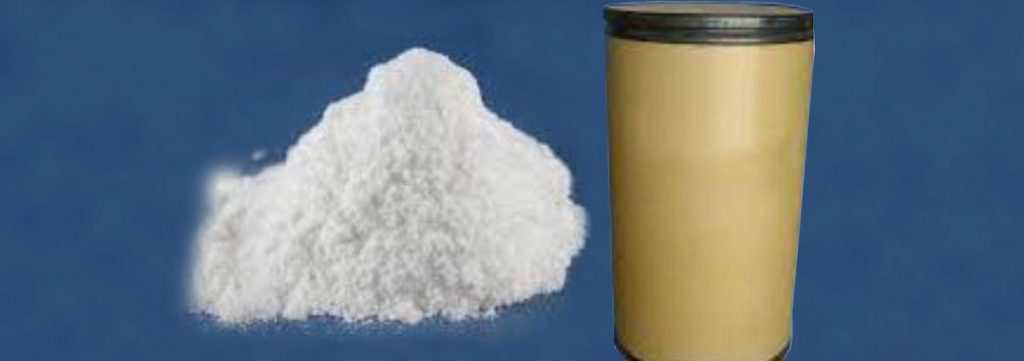Zinc Stearate
Zinc Stearate is a fine, soft, odorless white powder with a molecular weight of 632 and the chemical formula Zn(C18H35O2)2.
A prominent feature of this compound is its very small particle size with a diameter of less than one micron. Figure (1) shows the molecular structure of zinc stearate.

Fig (1): Molecular structure of zinc stearate
Zinc stearate is produced from various reactions, including the reaction of zinc oxide and stearic acid, which is shown in the following:

Zinc stearate has different ratios of palmitic and stearic acids. This chemical is an example of metal soaps and is insoluble in water and polar solvents such as alcohol. It melts at a lower temperature than other stearate, which causes the particles to separate faster when heated.
Zinc stearate is non-toxic and has no sulfur contamination. Among the chemical properties of zinc stearate can be mentioned as follows:
- It is very stable in high temperature conditions.
- Insoluble in water, alcohol and ethers.
- It is very resistant to water and provides water repellent properties.
Safety considerations of zinc stearate
The FDA has declared magnesium and zinc stearate as GRAS or generally safe to add to foods. The safety of stearate salts was also approved in 2001 for use in cosmetic ingredients.
Applications of zinc stearate
Zinc stearate is one of the amazing chemical compounds whose ability in lubrication, water repellency and extreme melting point and its compatibility have made it a useful substance in daily life and industrial applications. The three main uses of zinc stearate in various industries are:
- As a heat stabilizer
- Releasing substance
- Lubricant
Figure (2) shows how the consumption of zinc stearate is distributed in different industries.

Fig (3): Distribution of consumption on Zinc Stearate in different industries
Application of Zinc Stearate in different industries
Rubber and plastics industries
The rubber production industry is one of the important industries that contributes significantly to the country’s economy economically. To improve industrial applications, many studies have been done on rubber and its components. The results of experiments performed by researchers show that zinc stearate can completely replace common materials (stearic acid and zinc oxide) in the rubber processing industry.
The presence of zinc stearate in the presence or absence of fillers shows excellent properties in this industry. Zinc stearate is an “activating” compound to accelerate the vulcanization of rubber sulfur. Also, the lipophilicity of this compound makes it act as a phase transfer catalyst for soaping fats.
The plastics industry uses zinc soap as a lubricant, release agent and halogen absorber. In the past, stearic acid and zinc oxide were commonly used in the rubber heating process. These materials are actually a kind of activator and accelerator of the process. Based on this, it can be expected that zinc stearate can also play an important and fundamental role in the rubber heating process.
Cosmetics
This compound is used to prevent the absorption of moisture in pharmaceutical products or to create smooth textures in cosmetics and is a useful and safe product. Zinc stearate can be used as a preservative or water repellent in ointments and powders.
It is also used as a lubricant to improve texture in cosmetic products and has antiseptic and topical properties. It can be used as a preservative or water repellent in ointments and powders to treat acne and other skin conditions. It is also used as a lubricant to improve the texture of cosmetic products and has a local and astringent antiseptic property.
Stearate salts are generally used for lubricating properties. They also help prevent emulsions from separating into their liquid and oil components. Stearate salts increase the thickness of the fat (oil) part of cosmetic products. It is also added to varnishes as a smoothing agent. In cosmetics, zinc stearate is used as a lubricant and thickener to improve texture.
Paper industry
Zinc stearate is used in the paper industry as a coating material for better quality of paper and prevent clogging.
Construction industry
Zinc stearate is used in the concrete industry as a hydrophobic additive. Also, in the construction industry zinc stearate powder is used as a hydrophobic agent for gypsum.
Paint & Coating
Zinc stearate is widely used as a releasing agent for the production of various types of rubber, polyurethane, polyester processing system and metallurgical powder. These applications take advantage of its “non-stick” properties.
Zinc stearate as a lubricant or powder reduces the friction coefficient of moving surfaces and as a result easier movement of polymer chains on each other and also this material is used in paints and coatings as a dispersing agent.
Miscellaneous
In addition to the above, zinc stearate has other applications, the most important of which are:
- Use in washing powder
- Used as a friction reducing agent
- As one of the most powerful lubricants and release from mold
- External lubricant in plastic and polymer industries
- Matting agent for plastics and polymers
Color dispersing agent in all types of master batches

